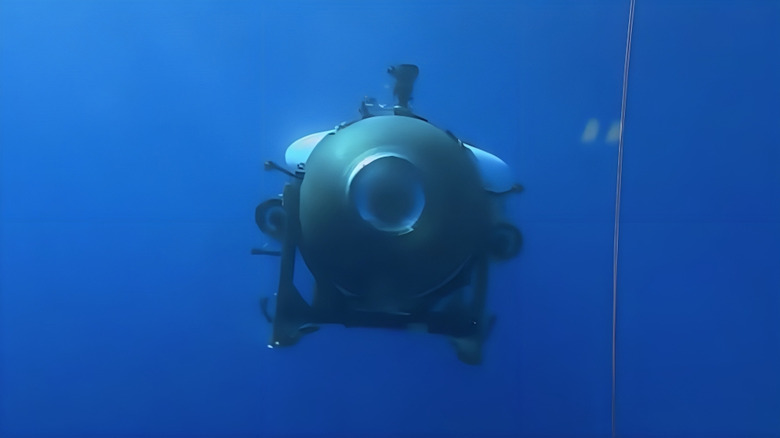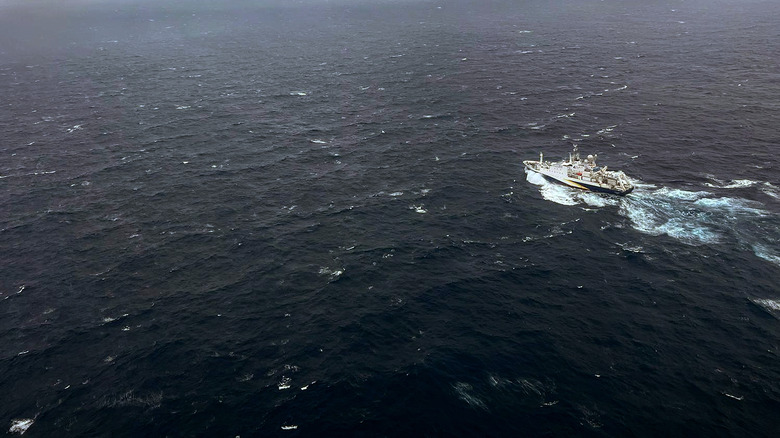More Grim Remains Of The Titan Submersible Have Been Found
In the summer of 2023, the world watched in horror as news broke of the missing Titan submersible. The private craft had been chartered to explore the wreckage of the Titanic 13,000 feet below sea level in the middle of the Atlantic Ocean before it lost contact with its mothership, Polar Prince. What followed was a heartstopping race against time, with rescue crews scrambling to locate the lost vessel before the five people on board ran out of oxygen. For four days, the fate of the missing submersible was one of the planet's biggest news stories, with news outlets speculating on the traumatic experiences of those trapped under the ocean and wondering whether they might survive.
Sadly, after the deadline for contact with the vessel passed, its fate was revealed, and it was what many experts had feared all along. Rather than suffering a loss of power, the submersible had succumbed to the enormous pressure of the ocean and imploded. Investigators concluded that the catastrophic collapse took place around 1 hour and 45 minutes into the journey, killing everyone on board in an instant. In the aftermath of the disaster, the U.S. Coast Guard launched a recovery mission to reclaim the wreckage of the submersible and the remains of those onboard from the ocean floor. Months later, the recovery was still ongoing, and two sets of presumably human remains had been discovered at the location of the wreckage as of October 2023.
The recovery effort
The first partial recovery of the Titan submersible took place just days after the U.S. Coast Guard declared its fate on June 22, 2023, after discovering the wreckage of the imploded vessel on the ocean floor. The recovery mission comprised a joint effort involving the U.S. Coast Guard, the National Transportation Safety Board (NTSB), and the Transportation Safety Board of Canada (TSB). By June 28, partial wreckage from the Titan had been recovered, along with "presumed human remains," which were sent for analysis, according to an official press release posted on the Coast Guard website. U.S. Coast Guard Marine Board of Investigation (MBI) Chair Captain Jason Neubauer said in a statement: "The evidence will provide investigators from several international jurisdictions with critical insights into the cause of this tragedy. There is still a substantial amount of work to be done to understand the factors that led to the catastrophic loss of the TITAN and help ensure a similar tragedy does not occur again."
A follow-up salvage mission to the wreckage of the Titan was completed on October 4, 2023, with the Coast Guard announcing in an October 10 press release that the "remaining Titan submersible debris and evidence" had been brought to the surface intact, confirming that "additional presumed human remains were carefully recovered from within Titan's debris and transported for analysis by U.S. medical professionals." According to the release, "The MBI is coordinating with NTSB and other international investigative agencies to schedule a joint evidence review of recovered Titan debris. This review session will help determine the next steps for necessary forensic testing."
Analyzing the remains
The two sets of presumably human remains recovered from the debris of the Titan submersible have yet to be formally identified. With no update regarding the findings of the analysis from the U.S. Coast Guard, it may be assumed that the investigation into what their press releases describe as "evidence" is still ongoing. It has not been reported whether the families of those onboard — who were informed of the fate of their loved ones upon discovery of the wreckage — are due to receive the remains once the analysis is completed.
The five people who lost their lives onboard the Titan submersible included the pilot, Stockton Rush, who was also the founder of OceanGate, the company that created the vessel. Since his death, experts in the field of submersibles have accused him of failing to uphold marine safety standards. Among his passengers was Hamish Harding, a British billionaire who earned his fortune in the aviation industry and was known for his enjoyment of extreme travel, including journeying to space; the veteran French explorer Paul-Henri Nargeolet, who led the first expedition to the wreck of the Titanic in 1987; Shahzada Dawood, former chairman of Pakistan's Engro Corporation; and Dawood's son, Suleman, who was just 19 years old at the time of the tragedy.
In a statement, OceanGate said (via Associated Press): "These men were true explorers who shared a distinct spirit of adventure, and a deep passion for exploring and protecting the world's oceans. We grieve the loss of life and joy they brought to everyone they knew."


